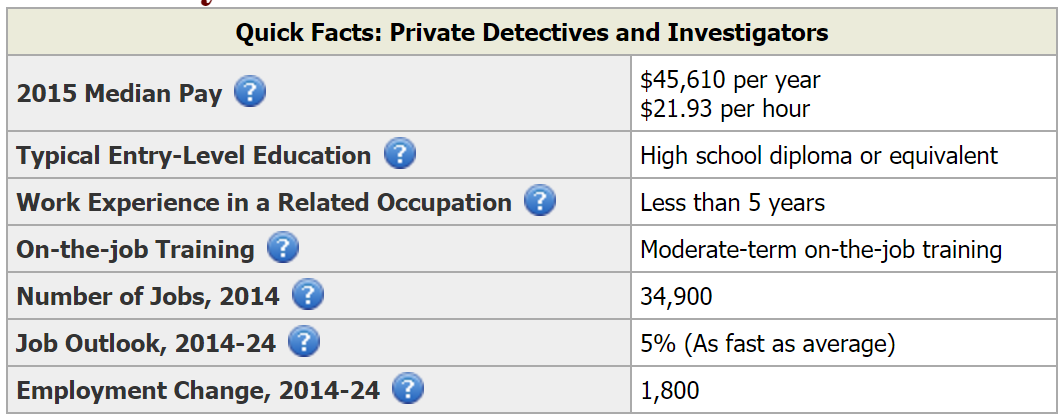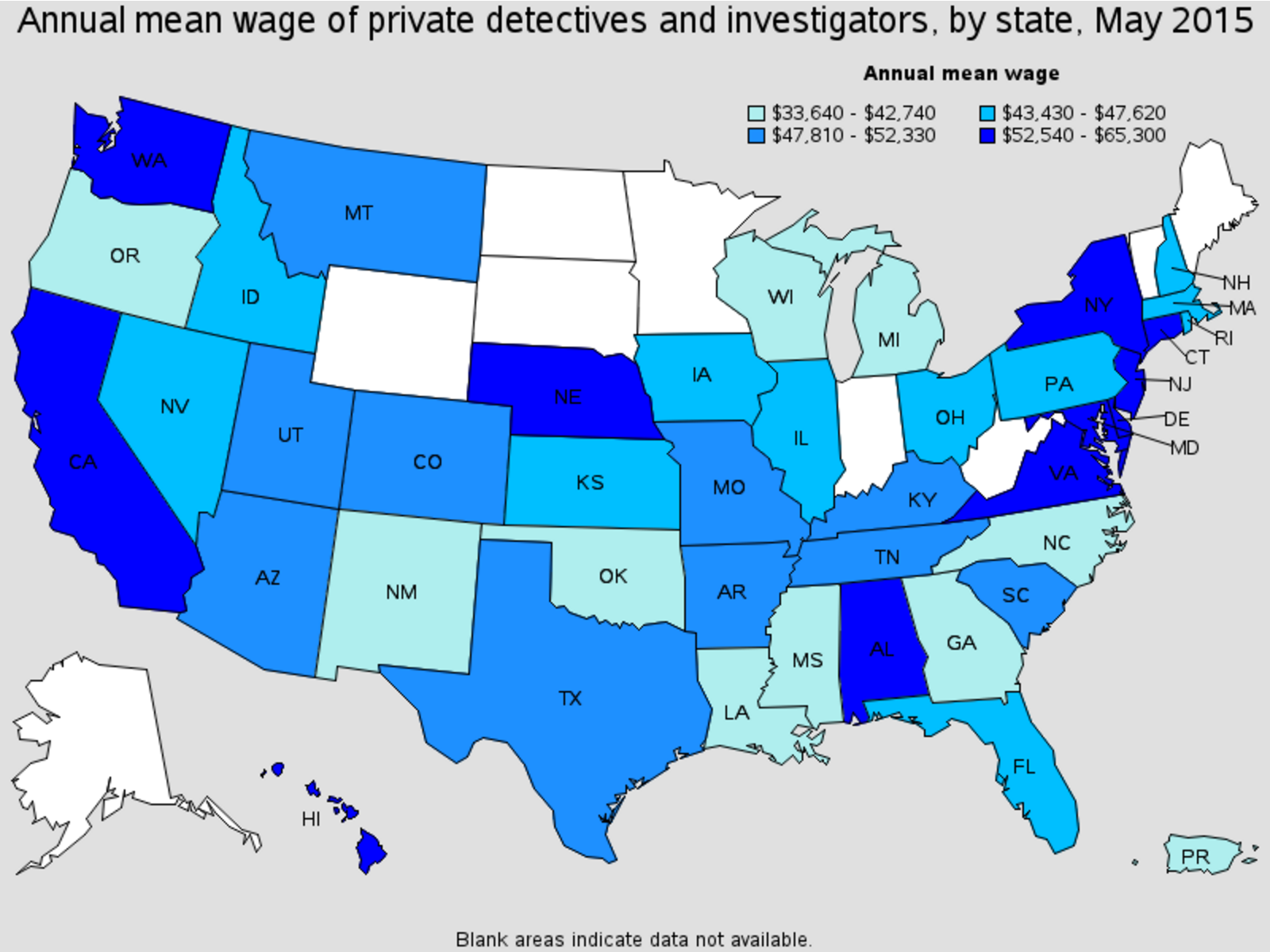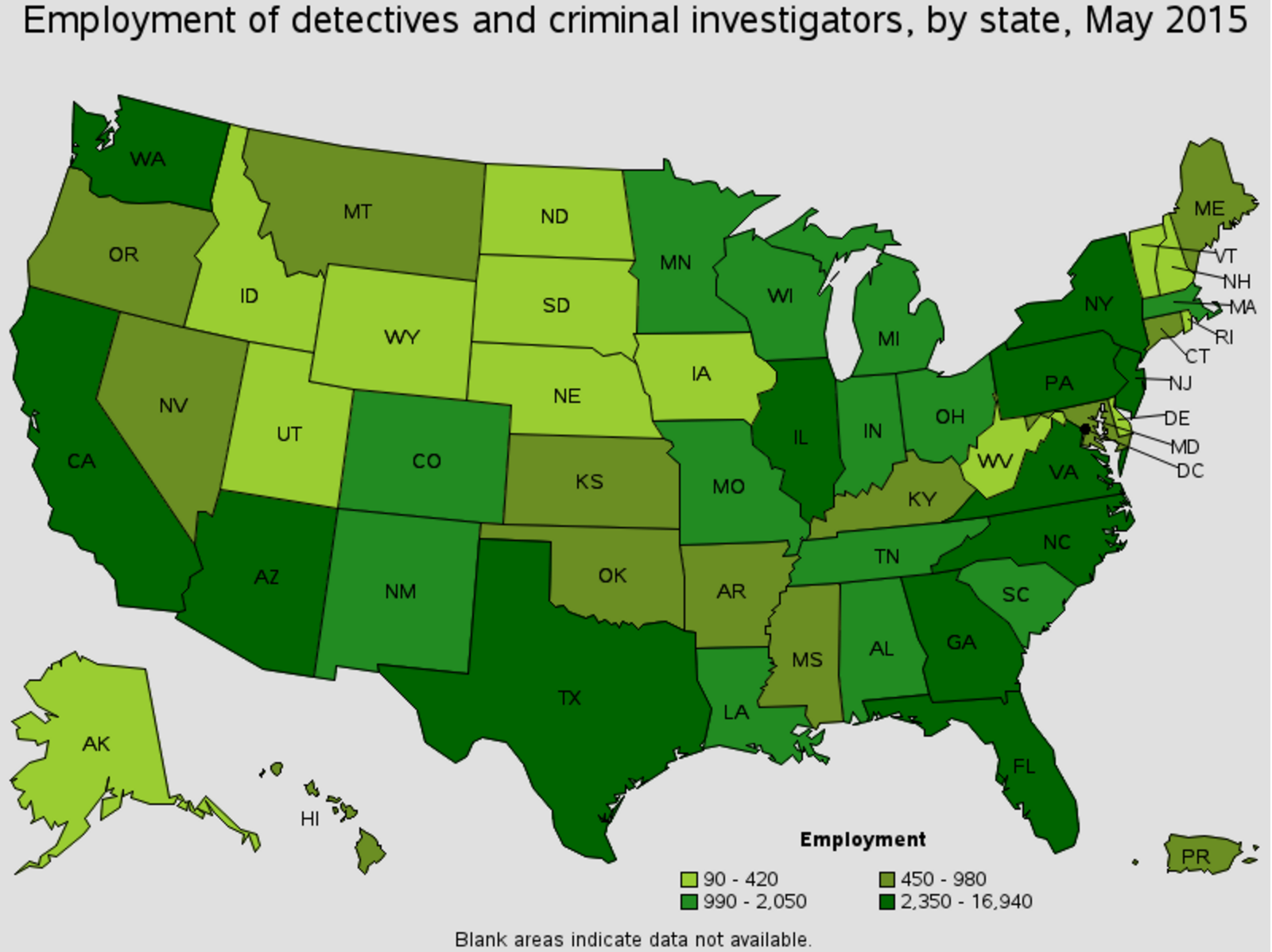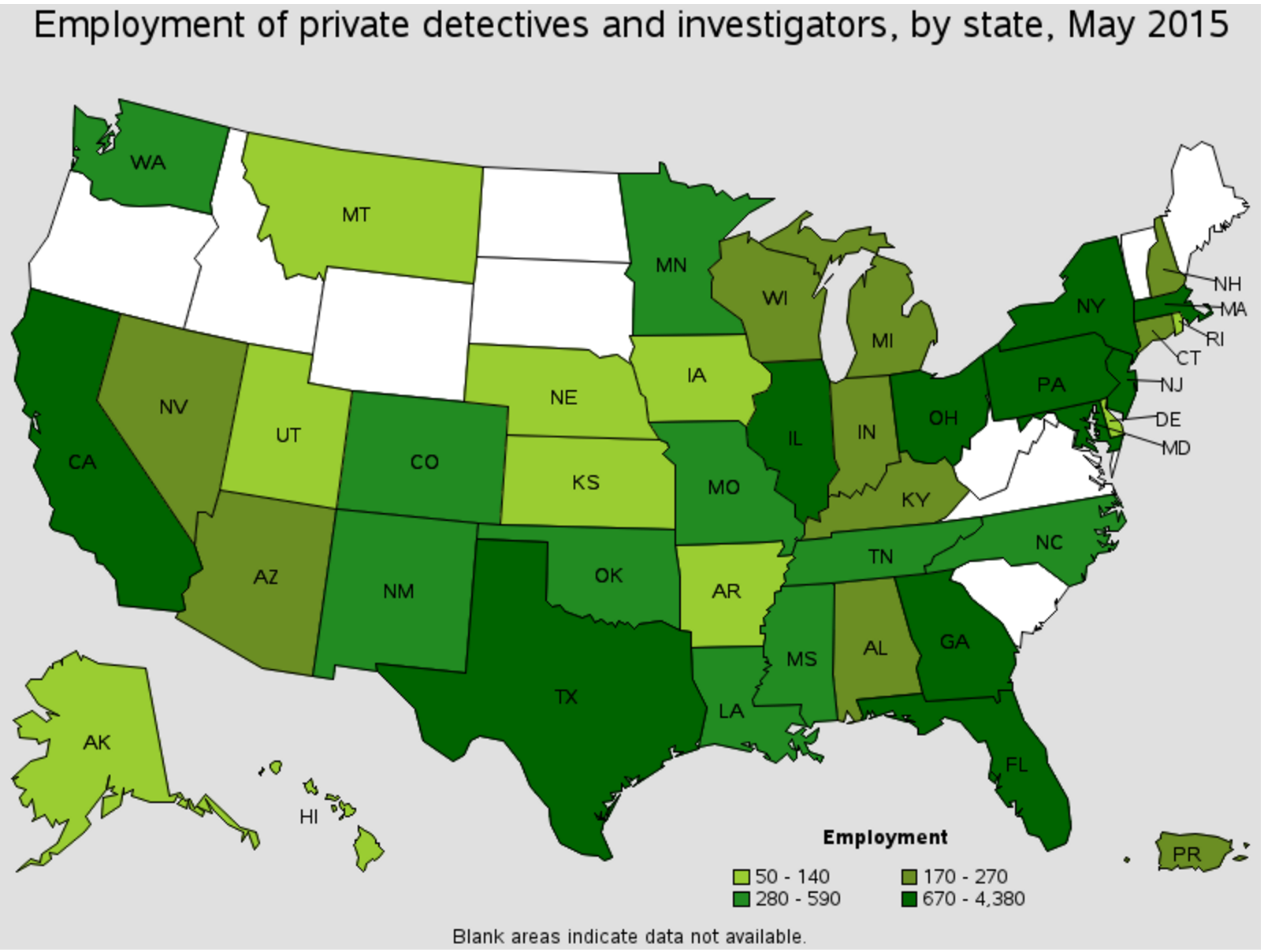Those who are fond of watching detective serials and movies want to become a detective in the future as well. Assuming to be like Sherlock Holmes is normal for us after we have known his character. But this dream seems to be forgotten and we will work to more realistic goals. Since crime rate is increasing these days, more detectives are needed in order to solve them. This is the reason why some police officers are trying to be like Sherlock Holmes. For those of you who still haven’t given up on your detective dreams, here is some information on the exciting career of being a detective.


Table Of Contents
- Average Detective Salary
- Detective Career Outlook
- How To Become A Detective
- Detective Job Description
How Much a Detective Earns
The basis of a detective’s salary at first will depend on his or her employer. Usually, a state employed investigator has higher earnings compared to a private one. This is because a private detective has intermittent work while the state employed has a steady work. The national average that is earned by a detective who is employed by the state is $76,000. The average salary for a private detective is around $45,000 only. The factors that affect a PI’s salary will be discussed later. Here are the factors that affect the salary of investigators that are state employed.
[asd_program_button /]Number of People
Like police officers, the population of a city decides the income of a detective. If the city is more populated, then the number of cases that need to be handled also rises. In this case, the salary will increase. The crime rate also affects the salary of an investigator. For example, the average salary for someone in the LA police department ranges from $44,000 to $88,000. Whereas, a member of the Miami Police department usually get $86,000 to $107,000 salary.

Location of job
Crime rate and population of the place are closely related to the location. But there is another factor, which is the cost of living. A detective will be paid higher if the cost of living in that certain location is higher. This is true with the case of private investigators as well. A pay of $116,00 is usually received by employees in District of Columbia, Alaska and New Jersey.
Education background
One can have a police job if he or she has a high school degree except at the federal level. Though this rules sometimes varies with state, most states do not require higher education certificates. However, officers and detectives are paid more if they have a degree after high school as there are states and departments who consider higher education important. The degree could be associate, bachelor or master’s. Your degree will affect your salary.
Number of years in the field
Your length of stay in the field will be a consideration on how much you will earn as an investigator. For those who are working in the field for 20 years already even if they are not promoted will get up to $15,000 increase. But if you are promoted as a Police Chief, you will be paid about $180,000 per year.
Delta Private Investigators
The salary of a private investigator depends on the how many cases he or she takes and solves them. The factors that affect the salary as mentioned above include the location, amount of discretion needed, amount of danger involved, required extra equipment and other many things. The price for the job will be quoted by the investigator after the problem is presented by the clients.

You will know here that a state-employed detective’s income is steady and through various means it can be increased. On the hand, the salary of a private investigator is quite unpredictable and can only be increased by fame (or rather being more discrete). Based on these financial facts, you will be able to decide the path to go.
Career Outlook of a Delta Detective
What we are going to talk about first is the growth in the fields. In 2015, the recorded public detectives or criminals investigators are about 106,000. Meanwhile, private investigators who do the same job were only 30,000. Private detectives have grown for about 5% in the industry. This means that there will be about 1,500 new jobs open by 2025. This is the same growth rate of 5% in different sectors. For public investigators, this is only 4% of the figure. Meaning to say, in 2025 it is expected that there will be 4,000 more jobs as a criminal investigator. This can be considered as an average rate of growth as well.
[asd_program_button /]The steady increase in employment is mainly due to the increase in population. As the population increases, more people need to be protected and more criminals need to be caught. But due to the strict implementation of laws and technology are more advanced, the crime rate is not increasing that much. Because of this, both the phenomena are just the same leading to average growth in each career.

The highest number of Criminal/Law Enforcement Investigators are found in Texas, California and New York. There are more employments in Western states and Texas compared to the eastern part. Private detectives are prominent in California, Texas and Florida with the southern states tending to employ more compared to the northern ones.
Let’s see what are the industries that hire these professionals most. As clear as day, The Local, State government and the Federal branch employ the most number of criminal investigators. On the other hand, private detectives are usually hired by Security Services, Consulting services and occasionally by the local government for consultation on a few cases.
Financially speaking, criminal investigators do get paid more than private ones. The annual average salary of criminal investigators is $80,000 while Private investigators get $52,000. Public investigators are paid most in District of Columbia, Alaska, and New Jersey in the aspects of geography and finance. It is in Alabama, Nebraska, and New Jersey were private detectives are paid most.
Comparing with different industries again, we see that for private industries, the most employing industries do not pay the highest. Private detectives are paid most in Electromedical, Navigational, Power generation, Metal Product forming and other such industries because of the most sensitive information that needs to be protected. Federal agencies, postal services, and educational institutes are paying public investigators most.

How To Become A Delta Detective
Keep in mind that there are two kinds of detectives. Some of them are private investigators who can be hired by the general public to investigate on certain things. Some of them are employed by the government and get this post after their promotion as a police officer. We will explore both avenues here.
[asd_program_button /]Finish your High School Studies
Due to excellent deduction skills, a deductive is able to take a leap from a police officer to a detective position. Thus, a general way in becoming a detective is to first complete high school and get into the police academy to become a police officer. Becoming a private investigator would mean getting a high school degree.
Get Yourself a Bachelor’s Degree
Usually, you don’t require a bachelor’s degree to get into the police academy. Although some officers would like to have other means of employment right after retirement. However, if you aspire to be a detective or land a job on federal level, you will need a bachelor’s degree.
A bachelor’s degree in either criminal justice or law will be required in most institutions to become a detective. If you have an associate’s degree, you will need at least 5000 hours. However, the time required is reduced to 4000 hours if you have a bachelor’s degree.
Gain experience
To become a professional detective (not employed by the state), you need to have some professional experience as an investigator. Fortunately, you have several options available. Getting employed by the government is basically the most common method. You will be regarded as a person with experience if you worked as a criminal investigator or an arson investigator. However, you can also choose to work as a licensed repossessor or office investigator.
Depending on the state you are applying in, the requirements of experience change. A state might require at least 3 years of experience, but in some it could be as long as 5 years.
Own a gun legally
Investigators who don’t have a firearms permit are prohibited from carrying their guns. There are several firearms with strict requirements such as completing a full training course before the permits are issued. So, if you are planning to become an armed investigator, you will need to go through weapons training course and then get the permit for the required weapons.
Undergo a Utah licensing test
Once you have fulfilled the requirements, you will need to take a state licensing examination. This test usually contains some multiple choice questions about state laws and some procedures that often need to be carried out. The test is only available for those who want to be private detectives. If you managed to pass, you will become a licensed private investigator.
Insure Yourself
Since investigating can sometimes be a dangerous line of work, it is important to get insurance done. Typically, we’re talking about a $10,000 medical insurance. However, it is important to also get a higher amount if you carry a firearm since you need to protect yourself from greater dangers and insure the gun itself.
By completing these steps, you’ll be good to go. You can finally fulfill your dream and become a detective! However, don’t forget that being a detective would mean exposing yourself to danger. If you want to pursue your dreams, learn all about the requirements and complete them as soon as you can.
What Does A Detective Do In Delta?
Crime Scene Investigation
It will be a detective’s duty to carefully assess a crime scene and come up with the most sensible deduction. The detectives find and bag evidence at the scene of the crime. They will need to keep anything suspicious that might lead to solving the case. In some cases, detectives can receive aid from the forensic investigation department, hence allowing them to come up with more deductions regarding the crime. Detectives should gather as many clues and evidences as possible by analyzing cameras and gathering information from eye witnesses.
[asd_program_button /]Criminal Research
An important aspect of a detective’s duties is to research previous case files in their free time. This is so that they can have an insight regarding criminal patterns and behaviors. In most cases, this will mean researching into previous records for them to know how the culprit might operate. In cases of serial killers or ‘copycats’, research helps a lot. This also helps detectives take down drug cartels by allowing them to identify any tactics being used. Through the help of general research, it will be a lot easier for detectives to identify the culprit or make any accurate deductions.
Accurately guessing the culprit
A detective’s main objective is to take the one at fault to justice. They will need to have a list of the suspects first before such thing could happen. This suspect pool maybe as big as 100 people or as small as none. They create this suspect list by drawing conclusions from the evidence gathered at the crime, eyewitnesses, research and a bit of criminal/forensic psychology. By means of getting statements from suspects, detectives are able to narrow down their list. With a narrowed down list, they will then have the suspects admit to their crimes.
Testifying In Court
Lastly, detectives will see to it that justice is served properly. To hasten the process, the court will sometimes summon them. They will often describe the scenario of the crime, and present evidences that will prove the crimes of the criminal. In some cases, they will even accompany the culprit to the jail.
Delta Private Detectives
The above duties are what a detective is expected to do. A private detective’s job description is a bit loose. Supposedly, detectives should meet their client’s needs regardless of how difficult it might seem, especially in terms of research. However, they can only go as far as certain laws will allow them when going on with their job. Some of the reasons why private detectives are hired include doing background checks, tracking finances, and even collecting clues and evidence to be used against a certain person. They should never act in a way that they can be easily recognized as a detective in public. Detectives are also prohibited from arresting an individual.
As you can see, the “Idiot Box” was right for the most part. The thing is, the duties and roles detectives undertake every single day are very stressful. They are never displayed on portrayed on the media or anywhere else. Detectives should make sure to find any clue they could get since a lot of people’s lives lie on them. If you’re really interested with the job, you should start knowing what it takes to be a detective now!
